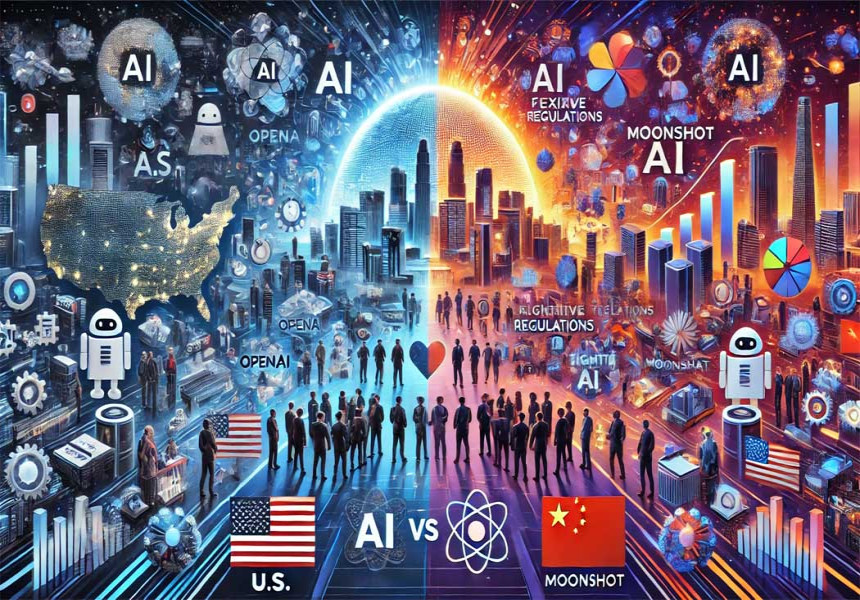Overview of AI Startups in the US and China
The landscape of artificial intelligence (AI) startups in the United States and China showcases significant differences in innovation, funding, regulatory environments, and market strategies. Both countries are vying for dominance in the AI sector, but they approach the challenge with distinct advantages and hurdles.
Market Size and Startup Ecosystem
Number of Startups: The United States leads with approximately 9,500 AI companies, nearly five times more than China's estimated 2,000 startups. This disparity indicates a more mature ecosystem in the U.S., fostering a diverse range of innovations.
Funding Trends: Historically, Chinese AI startups have attracted substantial funding. In 2017, for instance, they garnered 48% of global AI investments compared to 38% for the U.S. However, recent trends suggest that U.S. startups are regaining momentum, particularly after the success of OpenAI's ChatGPT.
Recent developments in the Chinese AI startup scene highlight significant capital raises and strategic investments from major tech players.
Moonshot AI's Funding: In August 2024, Moonshot AI raised $300 million, boosting its valuation to $3.3 billion. This round saw participation from Tencent and existing investor Alibaba, following an impressive $1 billion funding round earlier in February 2024. Moonshot AI is part of a group of rapidly growing startups dubbed the "Six Little Dragons," which aims to rival U.S. firms like OpenAI.
Baichuan AI's Growth: Another notable player, Baichuan AI, secured nearly $700 million in July 2024, further solidifying its position in the competitive landscape. This funding round also included investments from Alibaba and Tencent, showcasing the overlapping alliances among Chinese tech giants in the AI sector.
Investment Patterns: Both Alibaba and Tencent have made significant investments across multiple startups, with Alibaba backing all five of the "Little Dragons" and Tencent investing in four of them. Additionally, HongShan, Sequoia Capital's China investment arm, has supported three of these companies.
These capital raises reflect a broader trend where Chinese tech companies are aggressively investing in AI to enhance their competitive edge in response to global advancements, particularly those seen in the U.S. market. As geopolitical tensions continue to impact cross-border deals, these domestic investments become crucial for sustaining innovation within China's AI ecosystem.
Recent developments in the Chinese AI startup ecosystem indicate a robust investment landscape, particularly with significant contributions from foreign investors and major domestic tech companies.
Key Investments:
Zhipu AI: In May 2024, Saudi Aramco’s Prosperity7 Ventures fund made headlines by investing $400 million in Zhipu AI during its Series C funding round. This investment is part of a broader trend where foreign capital is increasingly flowing into China's AI sector, despite geopolitical tensions. Zhipu AI is recognized as one of China's leading AI firms, specializing in large language models (LLMs) and aiming to compete with U.S. counterparts like OpenAI.
Recent Funding Rounds: Zhipu AI's valuation reached approximately 20 billion yuan (about $2.8 billion) following this investment. The company has also secured additional funding from state-backed investors, further solidifying its financial standing in the competitive landscape of AI development in China.
Competitive Landscape
While the U.S. maintains a lead in AI innovation, China is rapidly closing the gap. Recent advancements in model performance, particularly among open-source models, suggest that Chinese startups are beginning to match their U.S. rivals in capability. For instance, Baichuan AI has received substantial backing from various local governments, enhancing its ability to develop resource-intensive models.
Strategic Alliances and Government Support
Chinese tech giants like Alibaba and Tencent are heavily investing in multiple AI startups, including Zhipu AI and Moonshot AI. These investments often come with strategic alliances that leverage cloud computing commitments and other resources. For example, Alibaba has invested in all five of the "Six Little Dragons" of Chinese AI startups, while Tencent has backed four.
Future Outlook
The future of China's AI ecosystem appears promising, with several startups already launching consumer-facing applications that could become significant market players. Companies like MiniMax, 01.AI, and ByteDance (the parent company of TikTok) have introduced various AI applications in the U.S., including avatar chatbots and productivity tools. As competition intensifies, it will be crucial to monitor which applications emerge as "killer" consumer apps in China and how they may influence global markets. The heavy state backing for these startups could provide them with a competitive edge in developing innovative solutions tailored to both domestic and international audiences
Innovation and Technological Advancements
Generative AI Focus: Both countries are home to notable generative AI startups. In China, notable players include Zhipu AI, Moonshot AI, Minimax, and 01.AI, which are often compared to U.S. counterparts like OpenAI and Anthropic. While these Chinese firms are rapidly developing their technologies, they still lag behind in terms of breakthrough applications and market leadership.
Performance Gap: Although China has made strides in developing large-scale AI models, U.S. models currently outperform them on benchmarks such as SuperCLUE. The consensus is that while Chinese models are improving, they remain one to two years behind their U.S. counterparts.
Regulatory Environment
Stricter Regulations in China: Chinese AI startups operate under stringent government regulations that impact their operational flexibility. These regulations are designed to ensure state legitimacy and address concerns related to privacy and ethical use of AI. In contrast, U.S. startups enjoy a relatively more permissive environment that encourages rapid innovation.
Government Support: The Chinese government has been aggressively promoting AI development as part of its national strategy. This includes significant investments in research and infrastructure aimed at fostering innovation. Conversely, while the U.S. government is increasing its focus on AI through funding initiatives (e.g., a proposed $32 billion increase in federal spending), it has historically been less involved in directly supporting the industry compared to China.
Talent Pool
Educational Output: China produces a higher number of AI-related degrees compared to the U.S., with nearly triple the number of undergraduate degrees awarded in AI fields. This educational output contributes to a growing talent pool that is essential for sustaining innovation.
Elite Talent Concentration: Despite China's larger output of graduates, the U.S. retains a concentration of elite talent within its top institutions. Approximately 60% of leading AI research institutions are based in the U.S., which attracts top-tier researchers globally.
In summary, while both the United States and China are key players in the global AI startup ecosystem, they exhibit contrasting characteristics. The U.S. benefits from a larger number of startups and a more flexible regulatory environment but faces increasing competition from China's rapidly evolving landscape. As both nations continue to invest heavily in AI technologies, their respective approaches will shape the future trajectory of global innovation in this critical field.








